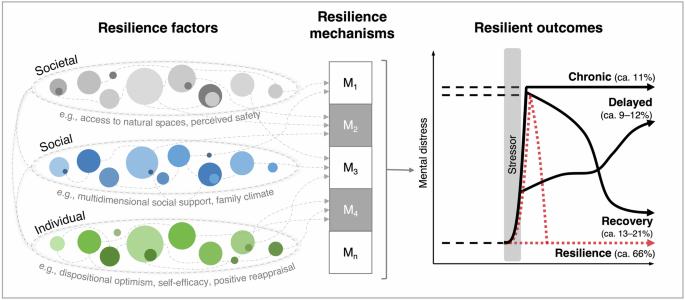A systematic review of individual, social, and societal resilience factors in response to societal challenges and crises
引用次数: 0
Abstract
Societal challenges put public mental health at risk and result in a growing interest in resilience as trajectories of good mental health during stressor exposure. Resilience factors represent multilevel psychosocial resources that increase the likelihood of resilient responses. This preregistered systematic review aims at summarizing evidence on the predictive value of individual, social and societal resilience factors for resilient responses to societal challenges and crises. Eligible studies examined the predictive value of resilience factors in stressor-exposed populations in high-income countries by means of multinomial regression models based on growth mixture modeling. Five databases were searched until August 2, 2023. Data synthesis employed a rating scheme to assess the incremental predictive value of resilience factors beyond sociodemographic variables and other resilience factors. An adapted version of the Newcastle-Ottawa Scale was used for risk of bias assessment. Fifty studies (sample sizes: 360–65,818 participants) with moderate study quality reported on various stressors (e.g., pandemics, natural disasters, terrorist attacks). Higher income, socioeconomic status and perceived social support, better emotion regulation and psychological flexibility were related to more resilient responses. The association between resilience factors and resilient responses was stronger in samples with younger mean age and a larger proportion of women. Most studies used non-representative convenience samples and effects were smaller when accounting for sociodemographic variables and other resilience factors. For many factors, findings were mixed, supporting the importance of the fit between resilience factors and situational demands. Research into social and societal resilience factors and multilevel resilience interventions is needed. Preregistration-ID: 10.17605/OSF.IO/GWJVA. Funding source: Robert Koch Institute (ID: LIR_2023_01). Higher income and socioeconomic status, better cognitive emotion regulation, and higher perceived social support were associated with more resilient stress responses, although most effects were small after accounting for other resilience factors.

系统审查应对社会挑战和危机的个人、社会和社会复原力因素
社会挑战使公众的心理健康面临风险,因此人们越来越关注抗逆力,即在面临压力时保持良好心理健康的轨迹。抗逆力因素代表着多层次的社会心理资源,可增加做出抗逆反应的可能性。本预先注册的系统综述旨在总结个人、社会和社会复原力因素对社会挑战和危机的复原力反应的预测价值。符合条件的研究通过基于增长混合模型的多项式回归模型,对高收入国家中面临压力的人群的复原力因素的预测价值进行了研究。截至 2023 年 8 月 2 日,共检索了五个数据库。数据综合采用了一种评级方案,以评估复原力因素在社会人口变量和其他复原力因素之外的增量预测价值。评估偏倚风险时使用了纽卡斯尔-渥太华量表的改编版。研究质量中等的 50 项研究(样本量:360-65,818 名参与者)报告了各种压力因素(如流行病、自然灾害、恐怖袭击)。较高的收入、社会经济地位和感知到的社会支持、较好的情绪调节能力和心理灵活性与较强的复原力有关。在平均年龄较小、女性比例较大的样本中,抗逆力因素与抗逆反应之间的关联性更强。大多数研究使用的是不具代表性的方便样本,在考虑社会人口变量和其他复原力因素时,影响较小。对于许多因素,研究结果好坏参半,这证明了复原力因素与情境需求之间契合度的重要性。需要对社会和社会复原力因素以及多层次复原力干预措施进行研究。预注册-ID:10.17605/OSF.IO/GWJVA。资金来源:罗伯特-科赫研究所(ID:LIR_2023_01)。较高的收入和社会经济地位、较好的认知情绪调节能力以及较高的感知社会支持与较强的应激反应复原力相关,尽管在考虑其他复原力因素后,大多数影响很小。
本文章由计算机程序翻译,如有差异,请以英文原文为准。
求助全文
约1分钟内获得全文
求助全文

 求助内容:
求助内容: 应助结果提醒方式:
应助结果提醒方式:


